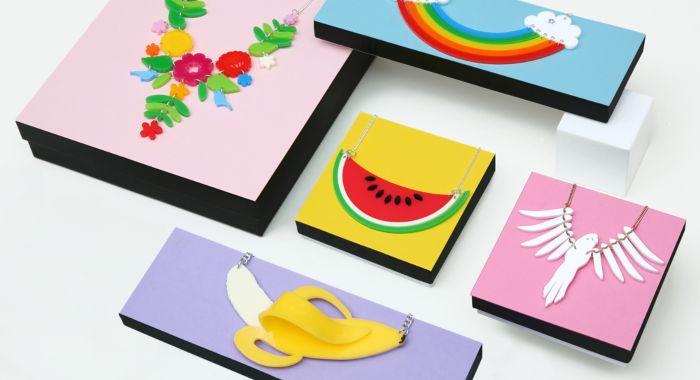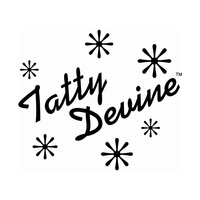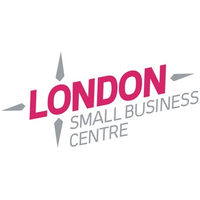GET YOUR CREATIVE BUSINESS OFF THE GROUND: CASE STUDIES FROM TATTY DEVINE, PATTERNITY & DAUGHTER OF JON
Our friends at London Small Business Centre outline some of the ways they can help you get your creative business off the ground, including three case studies from successful small Fashion businesses: Tatty Devine (Awarded MBEs for their services to the fashion industry) Patternity (Clients include Barbican, BBC, Somerset House, School of Life) Daughter of Jon (Range sold in Topshop, mentored by Ted Baker)
Words by London Small Business Centre
How to start a business?
Thank God for Google. Information that would have either been inaccessible or taken a long time to access many years ago, is now at your fingertips. But if you’re like the rest of us then you would have picked up on the fact that with this great power really does come great responsibility, that being, the burden of finding quality information. Hands up if you’ve spent hours sifting through websites trying to find what you were looking?
Today there are more start-ups than ever before (hell yeah!) and with this change has come more business support, advice, guidance and access to finance. Whilst we’re loving this new business revolution where in some cases a small business now has more power than many large corporations put together, the question of where to go when you get stuck or need to take the next step still remains.
We’ll ignore the fact that London Small Business Centre has trained over 13,000 entrepreneurs, helped over 22,000 people start businesses and are the longest running enterprise agency in the UK with a track record of having supported some incredible businesses (Tatty Devine, Foldability, Frame, Wrap it Up, Green Soccer Journal anyone?) And instead focus on the fact that their commitment to building long term relationships and helping small businesses is what has lead them to put together a truly unique offer for anyone wanting to start and grow their business…
1. Face-to Face Advice & Mentoring - I don’t know what to do
Are you looking for a mentor or business adviser?
A mentor is someone who coaches you on a personal level, someone who helps you develop your relationship with yourself, define your goals and overcome your fears.
A business adviser is someone who knows the logistics of a business; they have the commercial acumen and above all the insight and experience to get your business off to a great start. Today the two definitions overlap and are often misappropriated. What’s more, when you sign up for business advice and / or mentoring, you may find that it may not be delivered how you envisioned it, that being, face-to-face. The business advisers at London Small Business Centre do both although, they’re credibility and track record stems from having invested in their entrepreneurs so much so that their clients come back to them even years later when in need for some extra help.
2. Access to Finance – I have no money
Having been around for over 30 years means they really know your stuff. As an enterprise agency, London Small Business Centre works with some incredible partners and are able to offer more than one financial solution depending on your business and its needs. More importantly, they know that securing a business loan is only half the work; it’s what you do with that loan that matters which is why the advice and the finance go hand in hand so you’re guided on how to manage the logistical, conceptual and financial aspects of your business.
3. Learn New Skills – Do I have what it takes?
London Small Business Centre wants you take accountability for your business; they want you to be leaders so you can go on to create jobs for other people. It doesn’t matter whether you’re strong on the creative or the commercial aspects, maybe both or maybe even neither, if you’re passionate about an idea then they’re passionate to help you materialise it. They host alternative ways of expanding your knowledge and experience, be it through events, workshops, masterclasses and other subsidised programmes. Their freestart-up workshop in particular is so popular that other companies used to cheekily send their entrepreneurs to it.So the next time you start to type in Google ‘How to start a business’, give London Small Business Centre a search instead. Because you really don’t need to look anywhere else.
Here are 3 examples of how LSBC have helped Fashion start ups get their feet off the ground…
CASE STUDY: TATTY DEVINE
BEING SOLD IN SELFRIDGES, WORN BY CELEBRITIES LIKE BJORK AND KATY PERRY, TATTY DEVINE’S BRILLIANTLY QUIRKY AND INDEPENDENT HANDMADE JEWELLERY BRAND WAS SET-UP BY HARRIET VINE AND ROSIE WOLFENDEN OVER 15 YEARS AGO. IT HAS NOW QUICKLY BECOME A CULT CLASSIC IN BRITISH FASHION.
Founded by the creative pair, whilst still at university, they initially began creating wrist cuffs made out of leather samples and selling them at market stalls. “We got a call from Vogue, which inspired our first collection and then we showed our first collection at London Fashion week,” explains Harriet.
With their first collection hailed a success, Tatty Devine opened their flagship boutique in London’s Brick Lane in 2000, followed by another store in Covent Garden as well as over 300 stockists selling their products around the world.From inception, Harriet and Rose had developed a relationship with London Small Business Centre. Harriet says: “Throughout the last twelve years we have grown and changed so much and we have been able to access help from London Small Business Centre that has been a good fit with what we needed each stage; from grants, loans, forward planning and good advice.”
Then as the economy slowed in 2011 and consumer buying habits shifted, Harriet and Rosie returned to London Small Business Centre and worked with their business advisor to restructure the finance of the business, increase their profit margins and safeguard jobs to ensure a continued growth. “We’ve secured a bank loans and a small loan from London Small Business Centre to help through this period of rapid growth. We have just re-launched our website and launched a precious metal range using classic Tatty iconography, which is currently stocked exclusively by Selfridges and our own boutiques.
Tatty Devine had an incredibly successful year, with sales growing by 34% and creating an additional six jobs. Being nominated for NatWest Women in Business Awards, The Telegraph Small Shops Awards and included in Britain’s top 100 jewellers has not stopped the pair. “We have been invited to work on a number of high profile projects with Selfridges and are currently running a bespoke, live name necklace cutting studio on their ground floor and we are working on projects with Mary Portas, Colette and Tate,” adds Harriet.
The PR savvy pair have embraced the power of social media, increasing their brand exposure both online and offline, leading to coverage in several high profile publications.In January 2013, Tatty Devine were awarded MBEs in the Queen’s New Year Honours list for Services to Fashion.
CASE STUDY: PATTERNITY
Image: Karoliina Barlund
AWARD-WINNING CREATIVE ORGANISATION PATTERNITY, WAS FOUNDED BY ANNA MURRAY AND GRACE WINTERINGHAM.
The pattern loving duo’s business idea started after they created a blog in 2009, where they shared their view of the world with their online community. According to Anna, Patternity’s core ethos lies in the ‘belief that awareness of pattern has the power to positively engage us with our environment and each other’ and they achieve this with a unique research archive, design studio and events that use pattern as a vehicle to engage, educate and inspire.“With limited means, we developed the blog into a 500,000 strong online community.
Next came our design studio, where we work on collaborations and products using the research that Patternity produces to push the diversity of pattern interest and application,” says Anna. The young entrepreneurs have a strong background in design and creativity, with Anna previously working in art direction for several global brands, while Grace’s expertise lies in pattern production and fashion and interior print.
Despite being a relatively new business, Patternity has already attracted an impressive portfolio of clients. “Our Clients include The Barbican, The BBC, Central Saint Martins, The Foreign and Commonwealth Offices, The School Of Life, Granta, Levis, Selfridges and Somerset House,” says Anna.Before applying for the Creative Industry Finance Programme, Patternity’s biggest challenge was making sense of the financial aspect of their ambitious and unconventional business model. “We applied to the Creative Industry Finance programme as we wanted to get serious about the business side of creativity. We think very far into the future, but it’s important to remember that we are building the business from scratch and need to keep focused by taking one step at a time with the resources we have.”
“Regular meetings with our business adviser, Jeff Gilbert at London Small Business Centre, have allowed us to dedicate time solely to the financial planning of our business. Having a sound understanding of cash flow and putting our creative ideas into a business plan has given us confidence.Seeing things clearly in black and white has really helped our decision-making moving forward and enabled us to leverage funding through a Start-up loan.We have been able to plan our growth systematically, developing the necessary skills and getting closer to realising our plans to make Patternity a truly sustainable business,” explained Anna.
CASE STUDY: DAUGHTER OF JON
Image credit: Beth Davis
From having her bags sold in Topshop to being mentored by the directors of Ted Baker to securing the Vice President of wealth and investment management at Barclays as her financial adviser, Hedi started her handbag and accessories label, Daughter of Jon, with just an idea and a start up loan of £10k. She discloses her experience and vision to create something that lasts beyond her own life…
I’m ready to start my business
Over the last 10 years I worked in many fields in the fashion industry and I felt like I needed to get a wider perspective so I enrolled on a post-graduate program in culture management. Alongside my day job I ended up working on a dissertation about the history of the handbag as a cultural object.I realise now that I’ve kind of always envisioned myself in the position that I’m in now, with the direction I’m going and the way Daughter of Jon is evolving. But I guess I just hadn’t figured out how to get started or what it would look like to run your own business until I actually started doing it almost impulsively!Looking back I think getting experience in many fields and different types of jobs has helped me a lot now, so I’m happy I took my time to start a business! But I always felt like something was missing, that’s what in the end really pushed me to make the leap and start Daughter of Jon. It was, and is, a huge challenge but it’s absolutely worth it.
A twist of fate with Topshop
In my first year I was selling at various street markets and pop up markets in London to test my product, price range and to see who really my target audience is and what they look for. I’d recommend that to any designer.One day a buyer from Topshop saw me trading on my local street market on Chatsworth Road in Hackney and then approached me with an email. It was as simple as that. That was a massive step up for Daughter of Jon and I quickly figured out that I needed some advice and insights from professionals to help me on that exciting journey.
My next steps
I contacted Disc who immediately helped me with the manufacturing process and London Small Business Centre with the business side and funding.My adviser at London Small Business Centre was Peter and he’s great at analysing your current state of your business and quickly understands where you can take it in the future and what steps need to be taken to get there.He helped me to come up with a solid business strategy and helped me secure funding against that strategy.On top of all this, what I highly appreciate about Peter is his positive energy. He makes you see that what you thought was difficult or even impossible is actually totally achievable and manageable and helps you get there.
Ted Baker Mentoring
London Small Business Centre offered me to pitch my company to Ted Baker and all of the sudden I had a great group of highly professional mentors around me which is worth so incredibly much!At the first meeting with Ted Baker they gave me great advice and pointed out to me what I’ve done well so far (always great to hear and where my weak spots in my business were and what I had to improve and seek out to be able to grow and continue my journey in an efficient way. I have a meeting with them in a couple of weeks again and I can’t wait to go there. It’s not just the highly valuable advice you get, but also the experience of an amazing office. It’s modern, fun, quirky and really relaxed. You have the feeling you’re in someone’s home in a way.
Putting advice into action
One of the suggestions Ricky Green, Global Wholesale Manager of Ted Baker, gave me was to get in touch with a good financial advisor. Nothing is more essential in a young business than managing your cash flow in an efficient way. I took his advice and I’ve found a great mentor, the vice president of wealth and investment manager from Barclays bank that will help me to figure out how to maintain a healthy cash flow and to get investors on board.Securing the mentor from Barclays was much easier than it might look like! I signed up for two courses at Community Links, one about business planning and the other one about running a marketing stall, pretty much the two ends of the spectrum! Community Links is supported by Barclays Bank and they also collaborate on a mentor program. So I simply asked them if they could put me in touch with Barclays to join the mentor program, which they did, and that’s how the connection came about.
The future of Daughter of Jon…
The plan is simple: I want to create something that lasts longer than me, and I’m planning on living a long life! At the moment I’m focusing on the UK market until I build a stable foundation here and only then I’ll expand.In terms of product range, I plan to continue offering mainly bags & accessories for women but I’ve done a few experiments with men accessories, which have been well received. So I’m not announcing anything yet, but I’ll probably focus on that side of the business a little more going forward…Team-wise, I have a few great people helping me with various aspects of the daily tasks but when it comes to running the business, at the moment Daughter of Jon is still pretty much a one woman show. Which can be stressful, but I think at the beginning it’s essential to be involved in as many facets of the business as possible to be able know how your company works inside out and then define your strengths and weaknesses are so you know what you need to look for in the people that will be joining your team.



